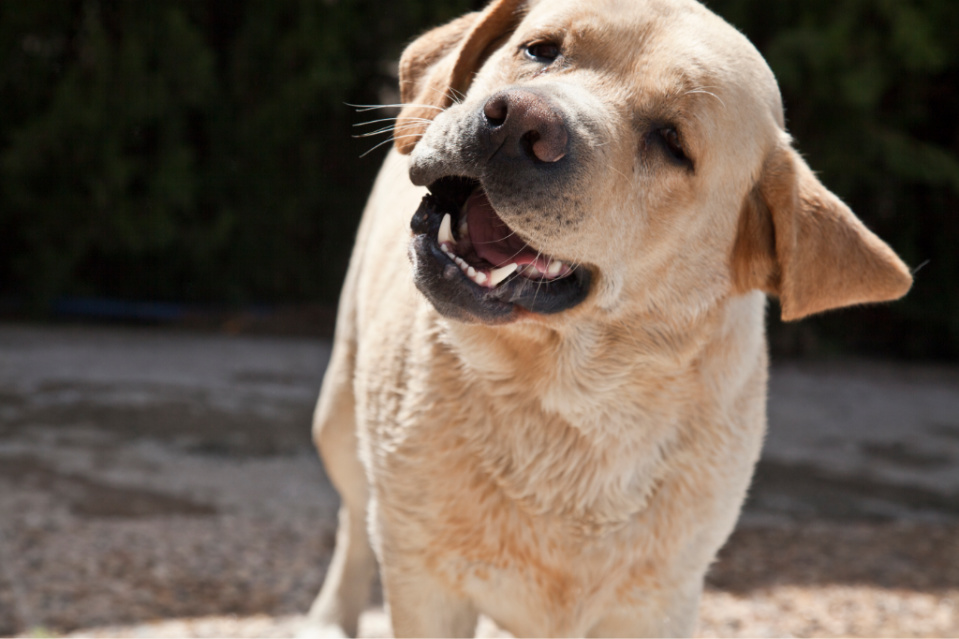Wondering why your Labrador doesn’t bark?
Among many things, many people think of getting a pet dog―specifically, a relatively large Labrador Retriever―for the added level of safety that they believe a canine pet can give them. They think that a Labrador barking at strangers can help them prepare in advance for any possible threat.
But what if your dog has never barked? Or your dog doesn’t bark anymore?
Barking is one of the ways that a Labrador can express themselves or look intimidating to strangers or to approaching people.
However, not all Labradors are cut out for this type of work.
Most Labradors have a naturally friendly nature that makes them people-oriented. Some Labradors are even timid and don’t bark much, if at all.
Labrador barking problems may be due to a number of possible causes, which we are going to discuss here in this article.
But, to understand the reasons why your Labrador doesn’t bark, let’s first take a look at why they do bark.
What is the reason behind your Labrador puppy barking?
Let’s take a look.
Understand Why Labrador doesn’t bark?
A Labrador barking at night may be because they want to go outside, they are hungry, or there’s a stranger approaching.
Whatever the reason is, barking often means that your dog is trying to tell you something.
Let’s break down the possible reasons why your dog is barking.
1. They want to tell you something.
Dogs will bark when they want to express something or want something.
This is common when they want to go outside to relieve themselves, are hungry, or are merely seeking your attention.
Dogs will also bark when they want to play with you or go outside for a little fun.
2. They are threatened by something or someone.
Another reason why Labradors bark may be because they are agitated or threatened by someone.
For instance, a Labrador may be barking at strangers, and they feel like they need to bark at that moment.
This is also the reason why some dogs make good guard dogs.
Some dogs might even bark at objects if they feel like it! Other times, they will bark at other animals that agitate or annoy them.
Additionally, dogs also bark if another person or animal comes into the space that they consider to be their territory.
3. They want to say “hi”.
Not all barks have to be taken as something aggressive. In fact, sometimes, it is their sign of greeting somebody or is an invitation to play or have fun with them.
These examples do not make for an exhaustive list, however. Your Labrador may bark for a multitude of other reasons that are completely normal and regular.
Now that we’ve established the possible answers to the question “Why do dogs bark?”, let’s tackle the reasons why your Labrador doesn’t bark.
Why my Labrador puppy doesn’t bark
Many dog owners get alarmed when their dog doesn’t bark or if they have never heard their dog bark.
However, it’s totally fine if they don’t want to bark most of the time. It may be because your Lab is generally the quiet type.
What you should look out for is when your Labrador abruptly stops barking even though they have been barking just fine all their lives.
This could be telling of a more serious situation that you need to go over with your vet.
That said, let’s explore the reasons why your Labrador doesn’t bark. Hopefully, these will help shed light on your Labrador barking problems and help you become more comfortable with your dog not barking as much as you expect.
1. They may have an underlying medical issue.

Like human beings, Labs can also be affected by medical issues that affect their barking.
If you find that your dog suddenly stops barking even though they usually bark a lot, it might be something medical.
In fact, if the change is incredibly abrupt, there is a large chance that it is a medical issue.
Your Labrador may be experiencing problems with their larynx that lead to them feeling pain or having difficulty with barking. Other medical issues include respiratory problems and other chronic disorders.
This research study states that the larynx is an important feature of the dog’s body for them to vocalize and express themselves. If there is a problem with the larynx, it will most likely affect their barking behavior.
Consequently, you may need to see the vet if your Labrador barking problems do not abate for some time.
Other reasons why your Labrador doesn’t bark may be because they have exerted too much effort barking and have hurt their throats.
Similar to how human beings can get a sore throat and have difficulty speaking, dogs may also have problems with barking when doing so feels uncomfortable for them.
In these cases, your dog may just need to take a little break and relax.
2. It’s just the way they are.
If your Lab is a few months old already, and you are wondering why your puppy doesn’t bark yet, it’s most likely because they are just wired that way.
It’s not extremely uncommon for Labradors to be very quiet or sometimes, not even bark at all.
Most pups would start barking regularly by the time they are a couple of months old. But if your Lab exhibits behavior such as not barking frequently or not at all, it’s not really anything to worry about. Sometimes, some Labs just prefer to bark as much.
You have to consider the personality of your dog. Some dogs are naturally shy or timid. Those traits could affect how much they bark or how vocal they are about what they want or their feelings.
Anyway, if your Lab does not bark as much, they will probably find other modes of communication so that they can communicate what they feel.
Just because your Lab does not bark does not mean that they will not whine or growl.
In any case, try to understand that your Lab may act that way because it is their personality and natural predisposition.
3. They are not accustomed to you yet.
Another possibility why your Lab doesn’t bark may be that your Lab is simply not used to you yet.
Sometimes, it will take weeks for your Labrador to develop a sense of familiarity with you and feel comfortable around you.
When you first bring your Labrador into your home, they may not immediately feel comfortable with barking or being vocal about their expressions. And that is completely okay! Just give them some time to adjust to the new living situation.
Eventually, most dogs will come around and start being vocal.
Hence, it’s not really a cause for alarm if your dog is new to the place and does not bark much.
4. They may have past trauma.
On the sadder side of things, past trauma could also be a reason why your Lab does not bark as much as you expect them to, especially when they are a rescue dog.
A lot of rescue dogs have a history of abuse that will probably affect their life for the long-term.
It’s not uncommon for them to be fearful or timid around humans, as certain experiences in their past may have influenced them to be that way.
Many dog owners do not care for their pets and even use aggressive behavior on them. So, if your Lab is a rescue animal and has a history of this kind of abuse, that may be a reason.
All you can do is give them the love and attention that they need. It is a sad fact that a lot of dogs have traumatic experiences, but it is something that you have to deal with.
Whether they start barking or not is not an issue. Your Lab is still capable of being a loving pet and dog just fine.
5. They are getting older.
Age may be one of the reasons why your Labrador doesn’t bark as much as they used to anymore.
Just like humans, their hearing may also decline, so they may not react to sounds as much as they would in their younger years.
6. They may have been trained not to bark by their previous owners.
If your Labrador Retriever has had previous owners, it may be possible that your pet was trained not to bark.
If this is the case, you may try to get in touch with their previous owners, or you can undo their previous training and train your Lab to bark whenever they want to.
What should I do when my Labrador doesn’t bark?
We have listed below some options that you can look into if your Labrador doesn’t bark.
1. Take your Labrador to the vet.
If you think that the reason why your Labrador doesn’t bark is because of a medical issue, it would be best if you visit the vet with your Lab.
This way, you can directly ask them what you could do to address the problem.
2. Give it time.
If your little Lab hasn’t had much time to adjust to their surroundings, this may be the reason why they do not bark.
Our advice? Give them a few weeks to become more comfortable with you and their surroundings.
While waiting, you can also try to spend more time with them.
3. Train them to bark whenever they want to.
There are many ways for you to get your Labrador to bark whenever necessary.
But before you embark on a journey to get them to “speak”, make sure first to have some treats on hand.
This way, you can positively reinforce the idea of training them to bark when they want.
Conclusion
Not all causes of less barking in a dog is something serious. Sometimes, it is just the way they are.
As a Labrador Retriever owner, you will have to respect and understand that as much as possible.
However, if you are concerned about what to do when your Labrador Retriever doesn’t bark, we have also enumerated some suggestions above that you can follow.
Either way, bark, or no bark, your Lab is still an awesome pet and will be a great companion for years to come.






